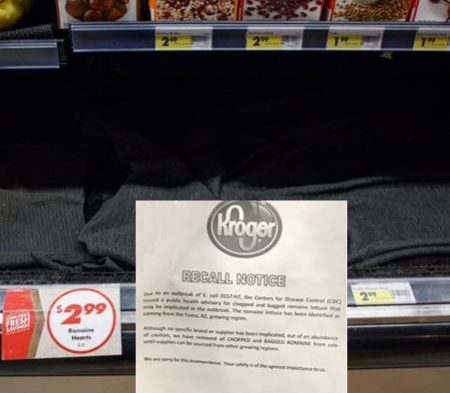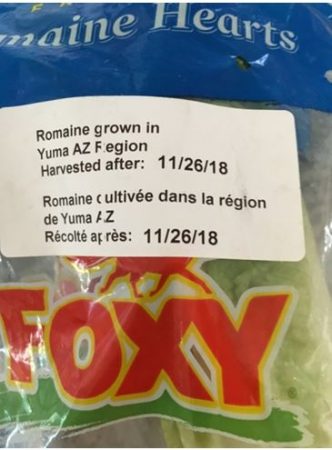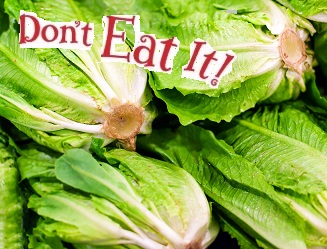Romaine lettuce E. coli outbreaks rattle the food and grocery industries-Where are we Now?
 The CDC and the FDA decision to order the removal of all romaine lettuce from supermarket shelves costs supermarkets millions of dollars. It also sent a very strong warning to the produce sector. Food Drive quoted David Acheson saying “It’s very effective, but talk about taking a sledgehammer to crack a walnut.” Having three outbreaks of E. coli in romaine lettuce in such a short time is unacceptable.
The CDC and the FDA decision to order the removal of all romaine lettuce from supermarket shelves costs supermarkets millions of dollars. It also sent a very strong warning to the produce sector. Food Drive quoted David Acheson saying “It’s very effective, but talk about taking a sledgehammer to crack a walnut.” Having three outbreaks of E. coli in romaine lettuce in such a short time is unacceptable.
Consumers feel that the repeat outbreaks indicate that no one is protecting the public and consequently a number of lawsuits have been filled. For example, the Lange Law Firm filed its first lawsuit in the latest outbreak in Federal court. A customer that ate Cesar salad at Beef O’Brady’s eatery in Crestview, Florida got sick and is suing the restaurant. Previously, Marler Clark filed 11 lawsuits related to the previous romaine lettuce outbreak.
Deverl Maserang, president and CEO of Earthbound Farm, wrote in an email to Food Dive that the government’s “broad advisory to avoid romaine is very disruptive.”
Changes being implemented
Labeling
The FDA Commissioner, Dr. Gottlieb agreed with a number of growers (Fresh Express, Taylor Farms, Dole Fresh Vegetables, and Earthbound Farm) to adopt a new label. The temporary label will list specifically where the product was grown and when it was harvested. It will also include a statement if the product was grown indoors.
The FDA Commissioner, Dr. Gottlieb agreed with a number of growers (Fresh Express, Taylor Farms, Dole Fresh Vegetables, and Earthbound Farm) to adopt a new label. The temporary label will list specifically where the product was grown and when it was harvested. It will also include a statement if the product was grown indoors.
Product Tracing
Producers and retailers realized the need to implement better processes to limit food safety issues in the supply chain. Walmart requested that its suppliers use blockchain to record production data to avoid another outbreak like this one.
Water testing
While Maserang said, “We have to do everything in our power to keep pathogens, which exist in the environment, out of the food supply.” However the FDA pushed back the implementation of the FSMA water testing for produce.
Scott Faber, Vice president of governmental affairs, Environmental Working Group, said” That’s the tragedy of this. It was almost certain that in the absence of testing the irrigation water that people would get sick. We’ve taken no steps to address the risk. It’s not rocket science, it’s food science.”
David Acheson acknowledged that a practice like testing water for contaminants is effective. But he believes that it is going to take more from everyone with a stake in produce to reduce the likelihood of another outbreak. “We will never get a leafy green that we can guarantee is 100% free of pathogens 100% of the time,” he said. “It will never happen because of the nature of the product, so we need to put in control systems that are as good as we can afford … and to continue to push the likelihood down.”
Results of the outbreak
According to Hilary Thesmar, senior vice president of food safety for the Food Marketing Institute, the removal of romaine lettuce was particularly damaging to the grocery industry because of three reasons (i) its timing (just before Thanksgiving), (ii) the large quantity of the product pulled and (iii) the expense to stores (labor costs, lost sales and time spent dealing with the crisis) associate with the recall.
According to Hilary Thesmar, senior vice president of food safety for the Food Marketing Institute, the removal of romaine lettuce was particularly damaging to the grocery industry because of three reasons (i) its timing (just before Thanksgiving), (ii) the large quantity of the product pulled and (iii) the expense to stores (labor costs, lost sales and time spent dealing with the crisis) associate with the recall.
Meanwhile court cases keep piling up, putting the spotlight on the safety of romaine lettuce. More changes are on the horizon, resulting in increased cost to growers, shippers, retailers and restaurants, and hopefully a safer lettuce to the consumers.
